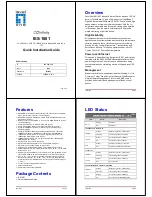
– 681 –
C
HAPTER
26
| SNMP Commands
snmp-server user
This command adds a user to an SNMP group, restricting the user to a
specific SNMP Read, Write, or Notify View. Use the
no
form to remove a
user from an SNMP group.
S
YNTAX
snmp-server user
username groupname
[
remote
ip-address
]
{
v1
|
v2c
|
v3
[
encrypted
] [
auth
{
md5
|
sha
}
auth-password
[
priv des56
priv-password
]]
no snmp-server user
username
{
v1
|
v2c
|
v3
|
remote
}
username
- Name of user connecting to the SNMP agent.
(Range: 1-32 characters)
groupname - Name of an SNMP group to which the user is assigned.
(Range: 1-32 characters)
remote
- Specifies an SNMP engine on a remote device.
ip-address
- The Internet address of the remote device.
v1
|
v2c
|
v3
- Use SNMP version 1, 2c or 3.
encrypted
- Accepts the password as encrypted input.
auth
- Uses SNMPv3 with authentication.
md5
|
sha
- Uses MD5 or SHA authentication.
auth-password
- Authentication password. Enter as plain text if the
encrypted
option is not used. Otherwise, enter an encrypted
password. (A minimum of eight characters is required.)
priv des56
- Uses SNMPv3 with privacy with DES56 encryption.
priv-password
- Privacy password. Enter as plain text if the
encrypted
option is not used. Otherwise, enter an encrypted
password.
D
EFAULT
S
ETTING
None
C
OMMAND
M
ODE
Global Configuration
C
OMMAND
U
SAGE
◆
Local users (i.e., the command does not specify a remote engine
identifier) must be configured to authorize management access for
SNMPv3 clients, or to identify the source of SNMPv3 trap messages
sent from the local switch.
◆
Remote users (i.e., the command specifies a remote engine identifier)
must be configured to identify the source of SNMPv3 inform messages
sent from the local switch.
◆
The SNMP engine ID is used to compute the authentication/privacy
digests from the password. You should therefore configure the engine
ID with the
snmp-server engine-id
command before using this
configuration command.
Summary of Contents for LGB6026A
Page 6: ...ABOUT THIS GUIDE 4...
Page 40: ...38 CONTENTS...
Page 60: ...58 SECTION I Getting Started...
Page 86: ...84 SECTION II Web Configuration Unicast Routing on page 517 Multicast Routing on page 575...
Page 162: ...160 CHAPTER 5 Interface Configuration VLAN Trunking...
Page 196: ...194 CHAPTER 6 VLAN Configuration Configuring MAC based VLANs...
Page 204: ...CHAPTER 7 Address Table Settings Clearing the Dynamic Address Table 202...
Page 238: ...CHAPTER 11 Class of Service Layer 2 Queue Settings 236...
Page 254: ...252 CHAPTER 12 Quality of Service Attaching a Policy Map to a Port...
Page 448: ...446 CHAPTER 16 Multicast Filtering Multicast VLAN Registration...
Page 470: ...468 CHAPTER 17 IP Configuration Setting the Switch s IP Address IP Version 6...
Page 576: ...574 CHAPTER 21 Unicast Routing Configuring the Open Shortest Path First Protocol Version 2...
Page 606: ...604 CHAPTER 22 Multicast Routing Configuring PIMv6 for IPv6...
Page 620: ...618 CHAPTER 23 Using the Command Line Interface CLI Command Groups...
Page 672: ...670 CHAPTER 25 System Management Commands Time Range...
Page 692: ...690 CHAPTER 26 SNMP Commands...
Page 700: ...698 CHAPTER 27 Remote Monitoring Commands...
Page 854: ...CHAPTER 34 Port Mirroring Commands Local Port Mirroring Commands 852...
Page 862: ...860 CHAPTER 36 Address Table Commands...
Page 958: ...956 CHAPTER 40 Quality of Service Commands...
Page 1034: ...1032 CHAPTER 42 LLDP Commands...
Page 1044: ...1042 CHAPTER 43 Domain Name Service Commands...
Page 1062: ...1060 CHAPTER 44 DHCP Commands DHCP Server...
Page 1206: ...CHAPTER 47 IP Routing Commands Open Shortest Path First OSPFv3 1204...
Page 1250: ...1248 SECTION IV Appendices...
Page 1256: ...1254 APPENDIX A Software Specifications Management Information Bases...
Page 1278: ...1276 COMMAND LIST...
















































